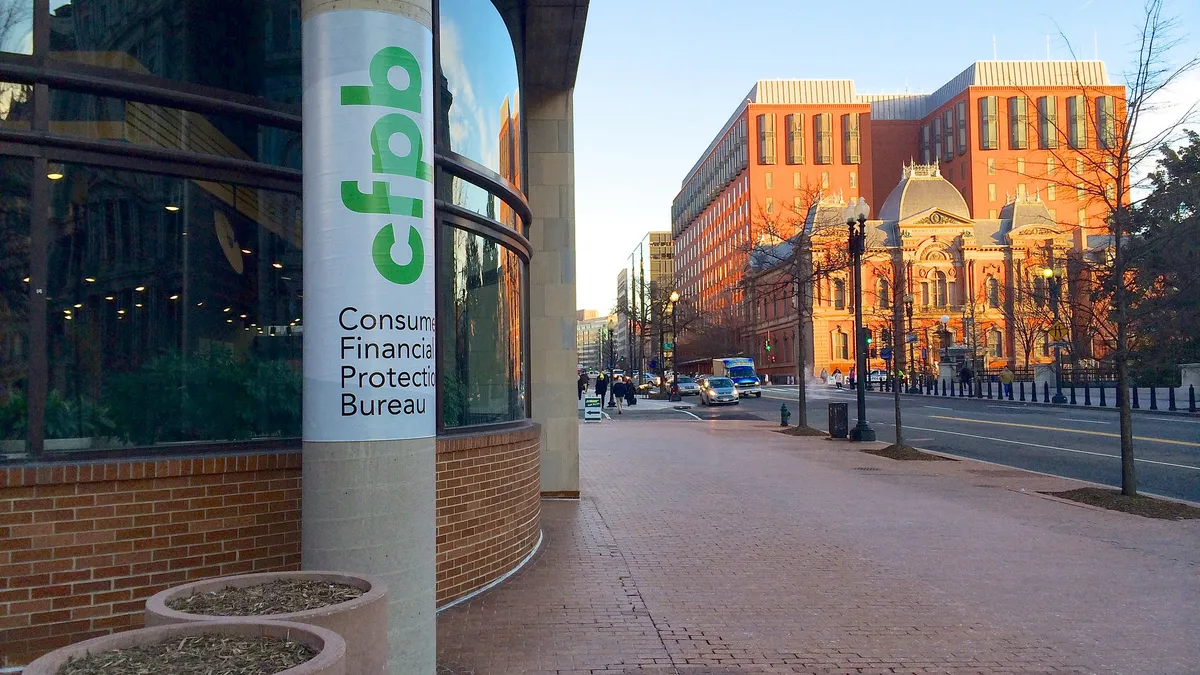Dive Brief:
- The Consumer Financial Protection Bureau (CFPB) clarified the definition of an "abusive" act or practice as one in which "the harm to consumers outweighs the benefit," according to an agency statement Friday.
- The bureau also said it would generally avoid "dual pleading" — that is, if the agency penalizes a company under the unfairness or deception standards, it won’t use the same set of facts to also find the company abusive unless it can provide a legal rationale for bringing a separate abusiveness claim.
- The Dodd-Frank Act gave the bureau the power to punish organizations over unfair or deceptive acts and added the abusiveness standard. But the CFPB let actions speak louder than words, issuing enforcement actions under the standard — in essence, establishing a precedent — without necessarily defining it.
Dive Insight:
Banks have sought a narrow definition of abusiveness for some time. But the CFPB’s clarification — and particularly the "dual pleading" clause — drew criticism from consumer advocates because the bureau’s enforcement history doesn’t seem to back it up.
Over the past nine years, the CFPB brought 32 enforcement actions using "abusiveness" as the reasoning. But 30 included both a claim of abusiveness and either unfair or deceptive acts or practices.
"The CFPB is limiting the authority that Congress gave it, taking an arrow out of its quiver and limiting accountability," Lauren Saunders, an associate director at the National Consumer Law Center, told American Banker.
Under the clarification, the CFPB said it will "seek monetary relief for abusiveness" only when companies show "a lack of a good-faith effort to comply with the law." The CFPB would still pursue restitution payments for consumers in those cases, the statement said.
Restricting when the CFPB will pursue civil money penalties may limit how effective the bureau’s enforcement could be, said Graham Steele, former minority chief counsel to the Senate Banking Committee.
"That is not the way to deter anybody," Steele, now the director of the Corporations and Society Initiative at Stanford University, told Bloomberg Law.
For her part, CFPB Director Kathy Kraninger said she is "committed to ensuring we have clear rules of the road and fostering a culture of compliance — a key element in preventing consumer harm."
"We’ve developed a policy that provides a solid framework to prevent consumer harm while promoting the clarity needed to foster consumer beneficial products as well as compliance in the marketplace, now and in the future," Kraninger said.
Will Corbett, director of litigation at the Center for Responsible Lending, said the clarification makes the abusiveness standard more difficult to show.
To be abusive, conduct must "materially interfere" with a customer’s ability to understand a term or condition attached to a financial product, or it must take "unreasonable advantage" of a customer’s inability to understand any risks or costs of a product or a consumer’s inability to make a choice in their service provider.
"The CFPB is deliberately tying the hands of its enforcement and supervision of abusive acts practices," Corbett said. "Kathy Kraninger and CFPB leadership should stick to enforcing the law and not trying to rewrite it."
The CFPB held a symposium last year on abusive acts or practices and asked for feedback on how the term should be defined.
"Is this really what we’ve waited for since 2018?" Allison Schoenthal, the head of Hogan Lovells’s consumer finance litigation practice, told Bloomberg Law.
The Supreme Court is set to hear oral arguments March 3 in a case arguing whether the CFPB’s single-director structure is constitutional.














